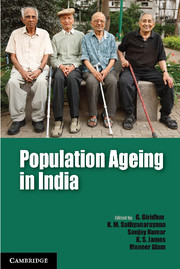Book contents
- Frontmatter
- Contents
- List of Figures
- List of Tables
- Preface
- Acknowledgements
- Introduction
- 1 Demographics of Population Ageing in India
- 2 Elderly Workforce Participation, Wage Differentials and Contribution to Household Income
- 3 Living Arrangements of Elderly in India: Policy and Programmatic Implications
- 4 Health Status of Elderly in India: Trends and Differentials
- 5 The National Policy for Older Persons: Critical Issues in Implementation
- 6 Policy Initiatives on Population Ageing in Select Asian Countries and Their Relevance to the Indian Context
- 7 Studies on Ageing in India: A Review
- Contributors
- Index
3 - Living Arrangements of Elderly in India: Policy and Programmatic Implications
Published online by Cambridge University Press: 05 August 2014
- Frontmatter
- Contents
- List of Figures
- List of Tables
- Preface
- Acknowledgements
- Introduction
- 1 Demographics of Population Ageing in India
- 2 Elderly Workforce Participation, Wage Differentials and Contribution to Household Income
- 3 Living Arrangements of Elderly in India: Policy and Programmatic Implications
- 4 Health Status of Elderly in India: Trends and Differentials
- 5 The National Policy for Older Persons: Critical Issues in Implementation
- 6 Policy Initiatives on Population Ageing in Select Asian Countries and Their Relevance to the Indian Context
- 7 Studies on Ageing in India: A Review
- Contributors
- Index
Summary
Introduction
Living arrangement of senior citizens in India is of increasing concern in view of the expanding cohort of older ages resulting from increasing longevity. Moreover, with the rapid decline in fertility, there is a substantial reduction in the number of children to take care of the elderly. The increasing number of the elderly has been of concern in the developed world for many years, both from the individual and social policy perspectives and for effectively responding to the increasing costs of providing care. In developing countries like India, where social pensions are meagre and access to health insurance is still very limited, the traditional support systems from family and community become important to uphold the Indian tradition of respect and care of the elderly. As a result, elderly members of the family have normally been taken care of within the family itself. The family and social networks provided an appropriate environment in which the elderly spent their lives, engaging in religious activities, participating in the rearing of grandchildren and following other pursuits. This way, the institution of family fulfilled the needs of the elderly in providing social, psychological and economic security. In addition, the family took care of the physical welfare as well as the psychological well-being of the older family members, and in turn, the elderly contributed by dispensing their acquired wisdom and prudence, distributing their wealth and belongings and maintaining family harmony resulting in symbiosis and reciprocity (Siva Raju, 2011).
- Type
- Chapter
- Information
- Population Ageing in India , pp. 74 - 95Publisher: Cambridge University PressPrint publication year: 2014
- 18
- Cited by



